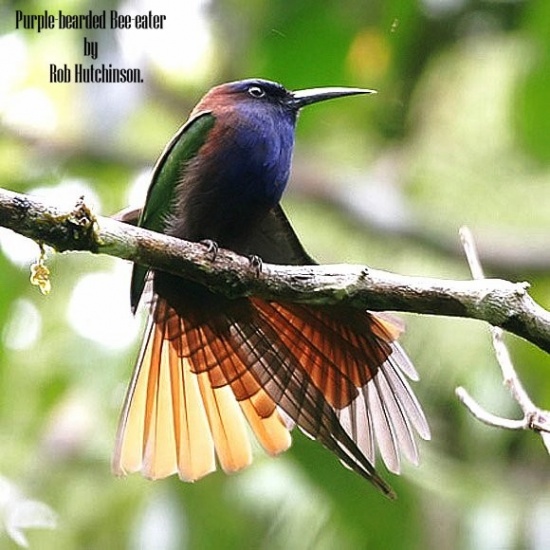m (genus tag, alternative name) |
|||
| Line 1: | Line 1: | ||
| − | |||
[[Image:Purple-bearded_Bee-eater.jpg|thumb|550px|right|Photo by Rob Hutchinson | [[Image:Purple-bearded_Bee-eater.jpg|thumb|550px|right|Photo by Rob Hutchinson | ||
<br>Location: Gunang Ambang,Selawesi,Indonesia]] | <br>Location: Gunang Ambang,Selawesi,Indonesia]] | ||
| + | '''Alternative name: Clebes Bee-eater''' | ||
| + | ;[[:Category:Meropogon|Meropogon]] forsteni | ||
| + | |||
==Identification== | ==Identification== | ||
25-26 cm (10 inches) long, plus 6 cm (21/2 inches) of tail streamers. It has a long tail, long, downturned bill, purple head, face, breast and upperbelly. It has long hanging throat feathers. The upperparts, wings and tail are green, with a red-brown nape. The female is simiular with a red-brown belly. Juveniles have a green crown and nape, blue beard and dusky face. They do not have the long tail feathers. The call is a quiet high-pitched ''szit'' or ''peep''. | 25-26 cm (10 inches) long, plus 6 cm (21/2 inches) of tail streamers. It has a long tail, long, downturned bill, purple head, face, breast and upperbelly. It has long hanging throat feathers. The upperparts, wings and tail are green, with a red-brown nape. The female is simiular with a red-brown belly. Juveniles have a green crown and nape, blue beard and dusky face. They do not have the long tail feathers. The call is a quiet high-pitched ''szit'' or ''peep''. | ||
==Distribution== | ==Distribution== | ||
| − | [[Sulawesi]], Indonesia. | + | [[Sulawesi]], [[Indonesia]]. |
==Taxonomy== | ==Taxonomy== | ||
| − | The Purple-bearded Bee-eater | + | The Purple-bearded Bee-eater is a near passerine bird in the bee-eater family Meropidae. It's the only member of the genus Meropogon. Its scientific name commemorates Eltio Alegondas Forsten (1811-1843) who collected in the East Indies between 1838 and his death. |
==Habitat== | ==Habitat== | ||
| Line 19: | Line 21: | ||
{{GSearch|Meropogon+forsteni}} | {{GSearch|Meropogon+forsteni}} | ||
*[http://www.orientalbirdimages.org/birdimages.php?action=birdspecies&Bird_ID=361&Bird_Image_ID=4263&Bird_Family_ID=74 View more images of this species on Orientalbirdimages] | *[http://www.orientalbirdimages.org/birdimages.php?action=birdspecies&Bird_ID=361&Bird_Image_ID=4263&Bird_Family_ID=74 View more images of this species on Orientalbirdimages] | ||
| − | [[Category:Birds]] | + | [[Category:Birds]] [[Category:Meropogon]] |
Revision as of 12:31, 19 June 2009
Alternative name: Clebes Bee-eater
- Meropogon forsteni
Identification
25-26 cm (10 inches) long, plus 6 cm (21/2 inches) of tail streamers. It has a long tail, long, downturned bill, purple head, face, breast and upperbelly. It has long hanging throat feathers. The upperparts, wings and tail are green, with a red-brown nape. The female is simiular with a red-brown belly. Juveniles have a green crown and nape, blue beard and dusky face. They do not have the long tail feathers. The call is a quiet high-pitched szit or peep.
Distribution
Taxonomy
The Purple-bearded Bee-eater is a near passerine bird in the bee-eater family Meropidae. It's the only member of the genus Meropogon. Its scientific name commemorates Eltio Alegondas Forsten (1811-1843) who collected in the East Indies between 1838 and his death.
Habitat
Dense forest.
Behaviour
This bird breeds inland during the dry season and moves to the coast in the rainy season. It makes its nests in burrows in riverbanks and cliffs. It does not form colonies. The diet includes insects, including bees, wasps and dragonflies and beetles, which are caught in flight.




